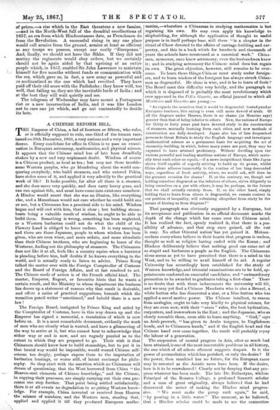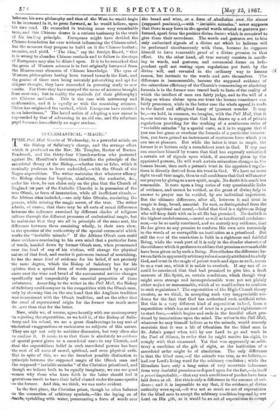A CHINESE REFORM BILL.
THE Emperor of China, a lad of fourteen or fifteen, who rules, or is officially supposed to rule, one-third of the human race, issued on 30th December., 1866, a very curious and a very important decree. Every candidate for office in China is to pass an exami- nation in European astronomy, mathematics, and physical science. It appears that the Chinese mind has of late been dreadfully shaken by a new and very unpleasant doubt. Wisdom of course is a Chinese product, as local as tea ; but may not those trouble- some Western peoples, who go blundering about the world con- quering everybody, who build steamers, and who entered Pekin, have stolen some of it, and applied it very adroitly to the practical work of life? It looks possible, for after all there is a steamer, and she does move very quickly, and does carry heavy guns, and can run against tide, and must have come into existence somehow. A Hindoo would assert that she was an illusion, like everything else, and a Mussulraan would not care whether he conk! build one or not, but a Chinaman has a practical side to his mind. Wisdom began and will end with him, that is clear ; but building steam- boats being a valuable result of wisdom, he ought to be able to build them. Something is wrong, something has been neglected, or a Western barbarian could not do what the child of the Flowery Land is obliged to leave undone. It is very annoying, and there are those Japanese, people to whom wisdom has been given, who are even wiser, and more sedate, and more ritualistic than their Chinese brethren, who are beginning to learn of the Westerns, finding out the philosophy of steamers. The Chinaman does not like it at all, feels like a country squire when a barrister is pleading before him, half doubts if he knows everything in the world, and is actually ready to listen to advice. Prince Kung talked the matter over with the Foreign Comptroller of Customs and the Board of Foreign Affairs, and at last resolved to act. The Chinese mode of action is of the French official kind. The master, Emperor, Regent, or favourite hints that be wants a certain result, and the Ministry in whose department the business lies draws up a statement of reasons why that result is desirable, and offers a series of practical suggestions, beneath which the vermilion pencil writes "sanctioned," and behold there is a new law !
The Foreign Board, instigated by Prince King and aided by the Comptroller of Customs, have in this way drawn up and the Emperor has signed a memorial, a translation of which is now before us. It is a most remarkable document, evidently the work of men who see clearly what is wanted, and have a glimmering of
the way to arrive at it, but who cannot bear to acknowledge that either way or end is new, and are vaguely puzzled as to the extent to which they are prepared to go. Their wish is that Chinamen should know how to build steamships, but to put it in that brutal way would be impossible, would wound Chinese self-
esteem too deeply, perhaps expose them to the imputation of barbarian leanings, or worse still, of latent contempt for philo- sophy. So they start with the assertion which no Chinaman will dream of questioning, that the West borrowed from China "the Heaven-sent elements of Chinese knowledge," and the Chinese, in copying their processes, are simply carrying out their own pro- cesses one step further. That point being settled satisfactorily, there is at all events no degradation in acquiring Western know- ledge. For example, China invented or received from Heaven the science of numbers, and the Western men, stealing that, applied and applied it till they produced European mathe-
matics,—wherefore a Chinaman in studying mathematics is but regaining his own. He may even apply his knowledge to shipbuilding, for although the application of thought to useful purpose is in itself perhaps base, still there "is a chapter in the ritual of Chow devoted to the affairs of carriage-building and car- pentry, and this in a book which for hundreds and thousands of years the schools have reverenced as a canonical work." China- men, moreover, once knew astronomy, even the husbandmen knew
it ; and in studying astronomy the Chinese mind does but regain its own. The great objection, however, still remains to be over-
come. To learn these things Chinese must study under foreign- ers, and to learn wisdom of the foreigner has always struck China- men as disgraceful. He alone is wise, and is he to learn of fools ? The Board meet this difficulty very boldly, and the paragraph in which it is disposed of is probably the most revolutionary which ever appeared in the Pekin Gazette, an official journal to which all lifoniteurs and Gazettes are young :—
" As regards the assertion that it would be disgraceful tostudynnder European teachers, this Baying is even still more devoid of truth. Of all the disgrace under Heaven, there is no shame (as Mencius says) greater than that of being inferior to others. Now, the nations of Europe for thirty or forty years past have devoted study to the construction of steamers, mutually learning from each other, and new methods of construction are daily developed. Japan also has of late despatched persons to Great Britain to study the English language and investigate mathematical science as a permanent basis for acquiring the art of steamship-building, in which, before many years are past, they may be expected to have attained proficiency. Without dwelling upon the various powerful and leading maritime nations of Europe, which mutu- ally treat each other as equals,—if a mere insignificant State like Japan shows itself capable of eagerly striving to build up its power, whilst China alone adheres immovably to the routine of her long-descended ways, regardless of fresh activity, where, we would ask, will then be the greatest occasion for shame? If, on the contrary, we, though not holding ourselves disgraced as the inferiors of others, strive diligently to bring ourselves on a par with others, it may be, perhaps, in the future that we shall actually outstrip them. If, on the other hand, simply holding that to learn from others is disgraceful, we remain content in our position of inequality, will refraining altogether from study be the means of freeing us from disgrace ?"
That paragraph was obviously suggested by a European, but its acceptance and publication in an official document marks the depth of the change which has come over the Chinese mind. It has realized the fact, openly realized it, that there is a pos- sibility of advance, and that step once gained, all the rest is easy. No other Oriental nation has yet gained it. Moham- medans everywhere believe in their hearts that progress is useless, thought as well as religion having ended with the Koran ; and Hindoos deliberately believe that nothing good can come out of so stupid and barbarous a people as the English. The Chinaman alone seems as yet to have perceived that there is a mind in the West, and to be willing to avail himself of its aid. A regular University has accordingly been established for the study of Western knowledge, and triennial examinations are to be held, ap- pointments conferred on successful candidates, and "extraordinary promotion to be awarded to graduates taking a first-class." There is no doubt that with these inducements the university will fill, and we may yet find a Chinese Mandarin who is also a Brunel, a white button who has discovered a star, or a blue button who has applied a novel motive power. The Chinese intellect, to reason from analogies, ought to take very kindly to physical science, for they are even now, with their " cram " rules, the beat hydraulists, carpenters, and ironworkers in the East ; and the Japanese, whose closely resemble them, seem able to learn anything. "God," says an Arab proverb, "has given to Arabs tongues, to Englishmen , heads, and to Chinamen hands," and if the English bead and the Chinese hand ever come together, the result will probably repay the labour of a generation.
The suspension of mental progress in Asia, after so much had been attained, is one of the most inscrutable problems in all history, the one which of all others oftenest suggests despair. Is it the power of accumulation which has perished, or only the desire? If the power, then mankind has no future, for the European races may be arrested as the Asiatic races have been. If the desire, how is it to be reawakened ? Clearly not by denying that any pro- gress whatever has been made. The late Dr. Ballantyne, whilozn Principal of the Benares College, a profound Sanscrit scholar and a man of great originality, always believed that he had discovered the secret of making the Hindoo mind progres- sive. "We must make the pump suck again," he said, "by pouring in a little water." The moment, as he believed, that a Hindoo scholar could be made to see the connection
between hisawn philosophy and that of the-West-he-would -begin to be interested in it, to press forward, as he would believe, upon his own road. He succeeded in training some very remarkable tfieneand this Chinese decree is a curious testimony to the truth Of his leading principle. Europeans might have derided the Chinese foundation for ever without influencing the Chinese _mind, but the moment they propose to build on it the Chinese hesitate, examine, and yield. "The idea," say the foreign Board, "that it is wrong to abandon Chinese methods and to follow in the steps of 'Europeans may also be dilated upon. It is to be remarked that tha germ of Western sciences is in fact originally borrowed from the Heaven-sent elements of Chinese knowledge. The eyes of Western philosophers having been turned towards the East, and the genius of these men being minutely painstaking and apt for diligent thought, they have succeeded in pursuing study to new results. For these they have usurped the name of sciences brought from over-sea ; but in reality the methods (of their philosophy) are Chinese methods. This is the case with astronomy and mrthematics, and it is equally so with the remaining sciences. China has originated the method, which Europeans have received as an inheritance." The hated notion of adopting. a new career is superseded by that of advancing in an old one, and. the reluctant pupil becomes immediately an eager student.































 Previous page
Previous page